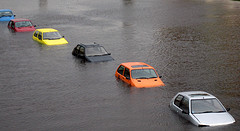How To Act on Climate Change
Climate change is a hot-button issue, often turned into a political football. For this and other reasons, it can be easy to lose sight of the real danger that it poses. If you aren’t worried about climate change, here are some questions to consider:
- Am I at risk if climate change continues?
- How likely is it that our planet will be negatively affected by climate change?
- How is climate change going to affect me personally?
 If you’ve never asked yourself these questions, you’re not alone: according to an article published in Social Marketing Quarterly,
If you’ve never asked yourself these questions, you’re not alone: according to an article published in Social Marketing Quarterly,
The results of a study conducted by Maibach, Roser-Renouf, and Leiserowitz (2009) showed that almost 50% of the American public remains unconvinced about the severity of climate change and therefore are not persuaded to adopt behaviors that mitigate climate change. Similarly, a UK study identified lack of knowledge, uncertainty and skepticism, distrust in information sources, externalization of responsibility and blame, belief in technology, belief that climate change is a distant threat, reluctance to change lifestyles, fatalism, feeling helpless, social norms, and other such factors as barriers to engaging in behaviors that mitigate climate change.
One way to motivate people to recognize and act on climate change, the article continues, involves using Protection Motivation Theory, which assumes that if individuals are presented with a “clear and real threat” and ways to overcome it, they will take action as long as the steps are easy enough to follow.
Click here to read the article, “‘Act on Climate Change’: An Application of Protection Motivation Theory,” published by Magdalena Cismaru and Romulus Cismaru, both of the University of Regina; Takaya Ono of Heriot-Watt University; and Kristina Nelson of the University of Regina in Social Marketing Quarterly. Click here to receive e-alerts about brand-new research from the journal.




























































































Unfortunately, in this fast food, buy now and worry later, take the easy route world we’ve slipped into, not enough people are willing to consider future consequences. Even now, with the evidence impossible to ignore, not enough people are willing to look at the impact they have on this impending threat–if it’s not right in front of their noses, causing them immediate suffering, they don’t want to think about it. Not only is education key in slowing the exponentially growing snowball we’ve created, but people need to know there are simple things they can do to contribute their share. There… Read more »